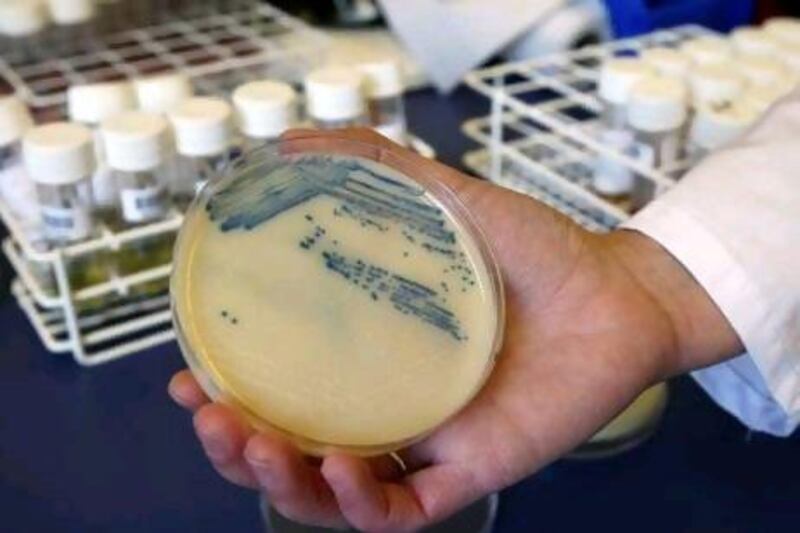ABU DHABI // Doctors called yesterday for urgent action to halt the spread of MRSA after a study found 730 people contracted the life-threatening superbug in public hospitals in Abu Dhabi last year.
The number is the equivalent of 30.5 cases per 100,000 population in the emirate - "a very concerning high level", delegates to a medical conference in the capital were told.
"From our perspective, based on the evidence that we have collected here, there is urgent action required to prevent and control the further development and spread and to hopefully reverse this trend," said Dr Jens Thomsen, the head of occupational and environmental health at the Health Authority-Abu Dhabi.
MRSA, or Methicillin-resistant Staphylococcus aureus, is a bacterium that resists most antibiotics and is a leading cause of potentially fatal infections.
S.aureus on its own is often present in skin and nostrils. It can cause a range of conditions, from minor infections to life-threatening illnesses such as pneumonia and meningitis, but can be successfully treated with antibiotics.
Healthy people may also carry MRSA with no ill effects but it is when they become ill or have an open wound that the bacterium becomes dangerous.
Speaking on the first day of the Abu Dhabi Medical Congress, Dr Thomsen revealed the results of the Antibiotic Resistance Surveillance Report, the first study of its kind in the GCC.
"Overall, this report demonstrates that antimicrobial resistance levels of the 16 most relevant groups of human pathogens against the key antibiotics needed for treatment … have reached a very concerning high level compared with other countries and compared with published historical local data," he said.
Dr Thomsen said patients who contract MRSA can expect longer than expected hospital stays, more treatment and possible complications with their infections. "They have also a slightly increased risk of death - that's why we are so concerned," he said. The death rate among the 730 people infected was not available in the report.
However, the doctor also urged people to not be too fearful as there are antibiotic drugs available to treat MRSA. His concern is preserving the effectiveness of these drugs for future generations by not overusing them now.
Dr Mansour Al Zarouni, a medical and molecular microbiologist and head of laboratories at Sharjah Medical District, said: "The whole issue, the problem, is once you get MRSA, a whole class of drugs that normally can be used are excluded. So what you do? You go to a very different class of antibiotics."
The main problem, he said, is the way some doctors prescribe medicine. "Doctors do not realise that they are one of the main sources of the problem. The problem arises because they are not prescribing the antibiotics correctly.
"And the main reason they are not prescribing antibiotics correctly - other than lack of awareness - is that they use medicines when the infection is not established.
"Only with wise choice of antibiotics for the right infection will many of these issues not come about."
A study last year by doctors at Tawam Hospital and UAE University researchers found the incidence of MRSA at the hospital, between 2003 and 2008, had risen from 5.2 to 12.3 per cent, meaning that 12.3 per cent of S.aureus is MRSA. Yesterday's report shows that the rate for healthcare facilities across the emirate is 34 per cent - almost triple that at Tawam.
The report looked at results from 61 Seha (Abu Dhabi Health Services Company) facilities but did not take into account the level of bacterial resistance to antibiotics at private hospitals, something that researchers aim to address by next year.
In July 2011, all hospitals - public and private - must monitor antibiotic resistance levels and report the data to the health authority, said Dr Thomsen.
In total, 19,119 patients were included in the 2011 report, the full details of which have not yet been made public.
Researchers focused on 10 bacterium present in hospitals. Alongside MRSA, several strains of pneumonia and tuberculosis bacteria showed 49 per cent and 17 per cent resistance to antibiotics respectively.
Without historical emirate-wide data to compare, the authority is unable to say whether there is an increase in antibiotic resistance overall.
A major concern, said Dr Thomsen, was the indication that other bacteria such as E.coli were starting to show resistance.
The report showed that 0.4 per cent of E.coli strains were showing resistance to drugs, a level that appears incremental but is of big concern, he said.





